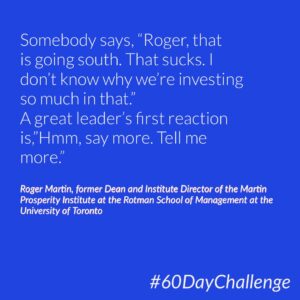 I don’t know about you, but sometimes I feel like a solitary voice in a crowd of standardization when I have conversations with people about transforming schooling to be more human-centered.
I don’t know about you, but sometimes I feel like a solitary voice in a crowd of standardization when I have conversations with people about transforming schooling to be more human-centered.
On a recent Knowledge Project podcast, host Shane Parrish interviewed Roger Martin, former Dean of the Rotman School of Management at the University of Toronto, asking him, “Are there common patterns to success you’ve seen across leaders?”
This part of Martin’s answer resonated with me:
Somebody says, “Roger, that is going south. That sucks. I don’t know why we’re investing so much in that.”
A great leader’s first reaction is,”Hmm, say more. Tell me more.”
It resonated for 3 reasons based on my previous experience as a public school superintendent:
- Curiosity – I’ve thought deeply about a compelling vision for teaching and learning. Curse of knowledge in action. In my time I have certainly failed in ways to fully communicate that vision to my stakeholders, and colleagues have pushed back. I’ve had to catch myself from letting my ego get in the way and just labeling the challenger as a whiner, ignorant or just plain stupid. When I caught myself falling into that leadership trap, I instead found myself embracing an inquiry stance and conveyed curiosity in that “Tell me more” manner suggested by Martin.
- Open mind – As the challenger responded to my inquiry–my curiosity–I found myself shifting into an open mind, as opposed to defending my ideas. I was willing to hear them out and approach what they had to say through an asset model. There may be an opportunity in this exchange. Maybe their idea could strengthen the direction we want to move in. Maybe we could synergize to create something together, even better. It’s challenging to maintain that inquiry stance, asking questions that convey respect, yet draw out the best the challenger has to offer.
- Willingness to learn – While I didn’t feel the need to respond or to accept the new ideas on the spot, I reflected on and processed the new ideas. Leaders should have a thirst for learning. They shouldn’t believe they have the ultimate idea/answer and others should just tow the line as commanded. Instead, leaders should strive to design a culture that honors the idea that anyone can (and should) be a part of something larger.
By approaching a challenge with curiosity, an open mind and a willingness to learn, leaders honor the challenger’s agency and send a message to all in the organization that they are welcome to exercise leadership by offering up new ideas and direction for the challenges faced in transforming schooling.
—–
❓ Provocations:
How do your colleagues respond when you push on the boundaries of schooling, challenge current assumptions and propose new ways of thinking and doing? How do you respond to any pushback? Do you like that response? Might you respond differently next time?
💎 Resource:
How successful leaders think – video w/Roger Martin
🧠 Mindsets:
Curiosity
💡 Areas:
Leadership
📣 Drop your thoughts in the comments, or in the Facebook group, and feel free to share resources. 🔥🔥🔥
- A silver lining - January 22, 2022
- Is our use of tech working against us? 🤔 - September 8, 2021
- What’s NOT going to change in the next 10 years? 🤔 - September 7, 2021